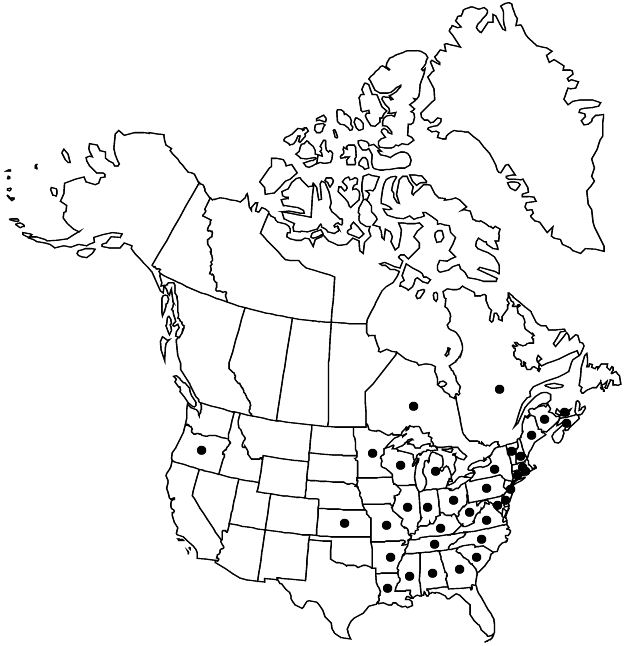Spiraea tomentosa
Sp. Pl. 1: 489. 1753.
Shrubs, 3–15 dm. Stems erect to ascending, rarely branched. Leaves: petiole 2–3 mm; blade bicolorous, ovatelanceolate, 3–6 × 1–2.5 cm, coriaceous, base cuneate, margins coarsely serrate to crenate on distal 3/4, (secondary teeth on large and long-shoot leaves), venation pinnate craspedodromous, secondary-veins prominent, apex acute or rounded, abaxial surface densely white to gray, tan, or rusty, tomentose, adaxial glabrous or puberulent. Inflorescences predominantly terminal, narrow, conic panicles, 150–15,000+-flowered, 5–30 × 3–20 cm, branching varying from compact to wide and spreading; branches tomentose. Pedicels 0.1–1.5 mm, tomentose. Flowers 4–6 mm diam.; hypanthia hemispheric, 0.5–1 mm, abaxial surface tomentose, adaxial glabrous; sepals triangular, 0.7–1.1 mm; petals usually light to dark-pink, sometimes white or purple, ovate to orbiculate, 1–1.5 mm; staminodes 0; stamens 15–20, 1 times petal length. Follicles cymbiform, 2–2.5 mm, tomentose to arachnoid. 2n = 24, 36.
Distribution

N.B., N.S., Ont., P.E.I., Que., Ala., Ark., Conn., Del., Ga., Ill., Ind., Kans., Ky., La., Maine, Mass., Md., Mich., Minn., Miss., Mo., N.C., N.H., N.J., N.Y., Ohio, Oreg., Pa., R.I., S.C., Tenn., Va., Vt., W.Va., Wis., in Europe
Discussion
Varieties 2 (2 in the flora).
P. J. Salamun (1951) conducted a comprehensive study of variation of the inflorescence across much of the range of Spiraea tomentosa and concluded that the two varieties could be segregated based upon the number of flowers or fruits per centimeter (density) of a lateral branch of the inflorescence. Intermediate populations have been identified, particularly in western New York and Pennsylvania. A. Gille (1949) discussed the overall distribution of S. tomentosa without evaluating varieties, and conducted a detailed study of its ecology in Quebec. The occurrences of this species in Oregon are as a weed in cranberry bogs; it has the potential to spread to natural wetlands. The species is reported as invasive in Belgium and Poland.
Selected References
None.
Key
| 1 | Pedicels usually not visible, 0.1–0.5 mm; flowers or fruits 12–20 per cm of branches. | Spiraea tomentosa var. tomentosa |
| 1 | Pedicels easily visible, 0.5–1.5 mm; flowers or fruits 6–11 per cm of branches. | Spiraea tomentosa var. rosea |